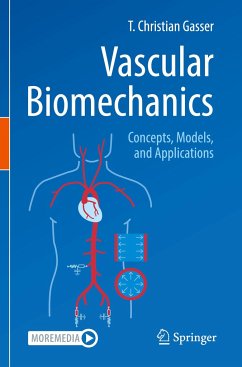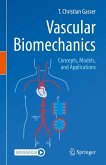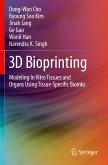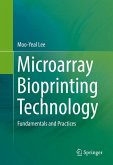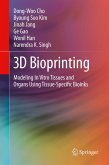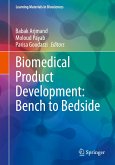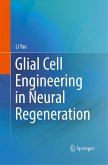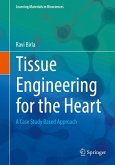- Broschiertes Buch
- Merkliste
- Auf die Merkliste
- Bewerten Bewerten
- Teilen
- Produkt teilen
- Produkterinnerung
- Produkterinnerung
This textbook serves as a modern introduction to vascular biomechanics and provides the comprehensive overview of the entire vascular system that is needed to run successful vascular biomechanics simulations. It aims to provide the reader with a holistic analysis of the vascular system towards its biomechanical description and includes numerous fully through-calculated examples. Various topics covered include vascular system descriptions, vascular exchange, blood vessel mechanics, vessel tissue characterization, blood flow mechanics, and vascular tissue growth and remodeling.
This textbook…mehr
Andere Kunden interessierten sich auch für
![Vascular Biomechanics Vascular Biomechanics]() T. Christian GasserVascular Biomechanics82,99 €
T. Christian GasserVascular Biomechanics82,99 €![3D Bioprinting 3D Bioprinting]() Dong-Woo Cho3D Bioprinting45,99 €
Dong-Woo Cho3D Bioprinting45,99 €![Microarray Bioprinting Technology Microarray Bioprinting Technology]() Moo-Yeal LeeMicroarray Bioprinting Technology119,99 €
Moo-Yeal LeeMicroarray Bioprinting Technology119,99 €![3D Bioprinting 3D Bioprinting]() Dong-Woo Cho3D Bioprinting45,99 €
Dong-Woo Cho3D Bioprinting45,99 €![Biomedical Product Development: Bench to Bedside Biomedical Product Development: Bench to Bedside]() Biomedical Product Development: Bench to Bedside52,99 €
Biomedical Product Development: Bench to Bedside52,99 €![Glial Cell Engineering in Neural Regeneration Glial Cell Engineering in Neural Regeneration]() Li YaoGlial Cell Engineering in Neural Regeneration112,99 €
Li YaoGlial Cell Engineering in Neural Regeneration112,99 €![Tissue Engineering for the Heart Tissue Engineering for the Heart]() Ravi BirlaTissue Engineering for the Heart60,99 €
Ravi BirlaTissue Engineering for the Heart60,99 €-
-
-
This textbook serves as a modern introduction to vascular biomechanics and provides the comprehensive overview of the entire vascular system that is needed to run successful vascular biomechanics simulations. It aims to provide the reader with a holistic analysis of the vascular system towards its biomechanical description and includes numerous fully through-calculated examples. Various topics covered include vascular system descriptions, vascular exchange, blood vessel mechanics, vessel tissue characterization, blood flow mechanics, and vascular tissue growth and remodeling.
This textbook is ideally suited for students and researchers studying and working in classical and computational vascular biomechanics. The book could also be of interest to developers of vascular devices and experts working with the regulatory approval of biomedical simulations.
Follows the principle of "learning by doing" and provides numerous fully through-calculated examples for active learning, immediate recall, and self-examination;Provides a holistic understanding of vascular functioning and the integration of information from different disciplines to enable students to use sophisticated numerical methods to simulate the response of the vascular system;Includes several case studies that integrate the presented material. Case studies address problems, such as the biomechanical rupture risk assessment of Abdominal Aortic Aneurysms, Finite Element analysis of structural and blood flow problems, the computation of wall stress and wall shear stress in the aorta.
This textbook is ideally suited for students and researchers studying and working in classical and computational vascular biomechanics. The book could also be of interest to developers of vascular devices and experts working with the regulatory approval of biomedical simulations.
Follows the principle of "learning by doing" and provides numerous fully through-calculated examples for active learning, immediate recall, and self-examination;Provides a holistic understanding of vascular functioning and the integration of information from different disciplines to enable students to use sophisticated numerical methods to simulate the response of the vascular system;Includes several case studies that integrate the presented material. Case studies address problems, such as the biomechanical rupture risk assessment of Abdominal Aortic Aneurysms, Finite Element analysis of structural and blood flow problems, the computation of wall stress and wall shear stress in the aorta.
Produktdetails
- Produktdetails
- Verlag: Springer / Springer International Publishing / Springer, Berlin
- Artikelnr. des Verlages: 978-3-030-70968-6
- 1st edition 2021
- Seitenzahl: 636
- Erscheinungstermin: 16. Februar 2023
- Englisch
- Abmessung: 235mm x 155mm x 32mm
- Gewicht: 1065g
- ISBN-13: 9783030709686
- ISBN-10: 303070968X
- Artikelnr.: 67308763
- Herstellerkennzeichnung Die Herstellerinformationen sind derzeit nicht verfügbar.
- Verlag: Springer / Springer International Publishing / Springer, Berlin
- Artikelnr. des Verlages: 978-3-030-70968-6
- 1st edition 2021
- Seitenzahl: 636
- Erscheinungstermin: 16. Februar 2023
- Englisch
- Abmessung: 235mm x 155mm x 32mm
- Gewicht: 1065g
- ISBN-13: 9783030709686
- ISBN-10: 303070968X
- Artikelnr.: 67308763
- Herstellerkennzeichnung Die Herstellerinformationen sind derzeit nicht verfügbar.
T. Christian Gasser is Professor of Biomechanics at KTH Royal Institute of Technology in Stockholm, Sweden, and Adjunct Professor at the University of Southern Denmark in Odense, Denmark. Professor Gasser is principal founder of VASCOPS GmbH, Graz, Austria and ARTEC Vascular Diagnosis AB, Stockholm Sweden. His scientific interest relates to vascular biomechanical problems, with particular emphasis on numerical techniques to solve clinically-relevant questions. Constitutive models developed by Professor Gasser have been implemented in many major Finite Element simulation packages, and translational research led to diagnostic software that is used at many clinical centers. He has authored almost 100 papers published in peer-reviewed premium journals, two international patents, 10+ book chapters, and gave more than 200 presentations at international conferences. With an h-index of 45 and over 12k Google scholar citations, Professor Gasser is amongst the highest-cited researchers in vascular biomechanics. He has taught numerous courses at undergraduate and graduate levels, served as supervisor for many engineering and clinical PhD students, is frequent member of examination and grading committees, and reviewer of several science councils as well as the most relevant scientific journals in the field.
1 Modeling in Biomechanics 1.- 1.1 The different perspectives 2.- 1.1.1 The engineering approach 2.- 1.1.2 The clinical approach 2.- 1.1.3 The pre- clinical approaches 2.- 1.2 Opportunities and challenges 2.- 1.3 Statistical analysis 3.- 1.3.1 Probability distributions 4.- 1.3.2 Hypothesis testing 7.- 1.3.3 Correlation amongst variables 9.- 1.3.4 Regression modeling 10.- 1.3.5 Mean difference test 13.- 1.3.6 Study design 14.- 1.4 Model definition 16.- 1.5 Model development and testing 17.- 1.5.1 Sensitivity analysis 17.- 1.5.3 Validation 21.- 1.6 Case study: Biomechanical Rupture Risk Assessment (BRRA) 21.- 1.6.1 Short comings of the current AAA risk assessment 21.- 1.6.2 Intended Model Application (IMA) 21.- 1.6.3 Failure hypothesis 22.- 1.6.4 Work flow and diagnostic information 22.- 1.6.5 Key modeling assumptions 23.- 1.6.6 Clinical validation 24.- 1.7 Summary and conclusion 25.- Appendix: Biomechanics Modeling 27.- A.1 Definitions and terminology in statistics 27.- 2 The circulatory system 29.- 2.1 Physiology 29.- 2.1.1 Vascular system 29.- 2.1.2 Key concepts 31.- 2.1.3 Cells in the vascular system 32.- 2.1.4 Macrocirculation 33.- 2.1.5 Lymphatic system 37.- 2.1.6 Microcirculation 38.- 2.1.7 Hemodynamic regulation 41.- 2.2 Mechanical system properties 42.- 2.2.1 Vascular pressure 43.- 2.2.2 Vascular flow 44.- 2.2.3 Vascular resistance 45.- 2.2.4 Transcapillary transport 45.- 2.3 Modeling the macrocirculation 45.- 2.3.1 Windkessel (WK) models 46.- 2.3.2 Vessel network modeling 57.- 2.4 Modeling the Microcirculation 63.- 2.4.1 Transcapillary concentration difference 63.- 2.4.2 Filtration 65.- 2.5 Summary and conclusion 70.- Appendix: Mathematical preliminaries 72.- A.1 Complex numbers 72.- A.2 Fourier series approximation 72.- Appendix: Basic circuit elements 73.- B.1 Resistor element 73.- B.2 Capacitor element 73.- B.3 Inductor element 74.- Appendix: Transport mechanisms 74.- C.1 Diffusion 74.- C.2 Advection 75.- Appendix: Osmosis 75.- D.1 Osmotic pressure 75.- D.2 Transport across semipermeable membranes 76.- 3 Continuum Mechanics 77.- 3.1 Kinematics 78.- 3.1.1 Deformation gradient 78.- 3.1.2 Multiplicative decomposition 79.- 3.1.3 Polar decomposition 79.- 3.1.4 Deformation of the line element 79.- 3.1.5 Deformation of the volume element 80.- 3.1.6 Deformation of the area element 80.- 3.1.7 Concept of strain 81.- 3.2 Concept of stress 85.- 3.2.1 Cauchy stress theorem 86.- 3.2.2 Principal stresses 87.- 3.2.3 Isochoric and volumetric stress 89.- 3.2.4 Octahedral stress and von Mises stress 89.- 3.2.5 Cauchy stress in rotated coordinates 91.- 3.2.6 First Piola-Kirchhoff stress 91.- 3.2.7 Second Piola-Kirchhoff stress 92.- 3.2.8 Implication of material incompressibility on the stress state 93.- 3.3 Material time derivatives 94.- 3.3.1 Kinematic variables 94.- 3.3.2 Stress rates 95.- 3.3.3 Power-conjugate stress and strain rates 96.- 3.4 Constitutive modeling 97.- 3.4.1 Some mechanical properties of materials 97.- 3.4.2 Linear elastic material100.- 3.4.3 Hyperelasticity 102.- 3.4.4 Viscoelasticity 105.- 3.5 Governing laws 113.- 3.5.1 Mass balance 114.- 3.5.2 Balance of linear momentum 116.- 3.5.3 Maxwell transport and localization 118.- 3.5.4 Thermodynamic principles 119.- 3.6 General principles 125.- 3.6.1 Free body diagram 125.- 3.6.2 Initial Boundary Value Problem 126.- 3.6.3 Principle of Virtual.- 3.7 Damage and failure 129.- 3.7.1 Physical consequences 129.- 3.7.2 Strain localization 130.- 3.7.3 Linear Fracture Mechanics 132.- 3.7.4 J.- Integral 133.- 3.7.5 Cohesive zone modeling 133.- 3.8 Multiphasic continuum theories 134.- 3.8.1 Mixture theory 134.- 3.8.2 Poroelasticity theory 134.- 3.9 Summary and conclusion 135.- Appendix: Mathematical preliminaries 136.- A.1 Laplace and Fourier transforms 136.- A.2 Matrix algebra 136.- A.2.1 Trace of a matrix 137.- A.2.2 Identity matrix 137.- A.2.3 Determinant of a matrix 137.- A.2.4 Inverse and orthogonal matrix 138.- A.2.5 Linear vector transform 138.- A.2.6 Eigenvalue problem138.- A.2.7 Relation between the trace and the eigenvalues 139.- A.2.8 Cayley-Hamilton theorem 139.- A.3 Vector algebra 140.- A.3.1 Basic vector operations 140.- A.3.2 Coordinate transformation 142.- A.4 Tensor algebra 144.- A.4.1 Spherical tensor 144.- A.4.2 Tensor operations 145.- A.4.3 Invariants of second-order tensors 145.- A.5 Vector and tensor calculus 146.- A.5.1 Local changes of field variables 146.- A.5.2 Divergence theorem 147.- Appendix: Some useful Laplace and Fourier transforms 148.- B.1 Laplace transforms 148.- B.2 Fourier transforms 150.- Appendix: Some useful tensor relations 151.- 4 Conduit vessels 153.- 4.1 Histology and morphology of the vessel wall 154.- 4.1.1 Layered vessel wall organization 154.- 4.1.2 Differences between arteries and veins 155.- 4.1.3 Extra Cellular Matrix (ECM) 156.- 4.1.4 Cells 157.- 4.2 Mechanical properties and experimental observations 158.- 4.2.1 Aorta 160.- 4.2.2 Carotid artery 161.- 4.2.3 Coronary artery 162.- 4.2.4 Iliac artery 163.- 4.3 Vascular diseases 163.- 4.3.1 Diagnostic examinations 164.- 4.3.2 Atherosclerosis 165.- 4.3.3 Biomechanical factors in atherosclerosis 167.- 4.3.4 Carotid artery disease 169.- 4.3.5 Coronary heart disease 171.- 4.3.6 Aneurysm disease 172.- 4.4 Vascular adaptation 174.- 4.5 Constitutive descriptions 175.- 4.5.1 Capacity of a vessel segment 176.- 4.5.2 Hyperelasticity for incompressible solids 177.- 4.5.3 Purely phenomenological descriptions 178.- 4.5.4 Histo-mechanical descriptions 183.- 4.5.5 General theory of fibrous connective tissue 185.- 4.5.6 Residual stress and load.- free configuration 188.- 4.5.7 Visco-elastic descriptions 189.- 4.5.8 Damage and failure descriptions 191.- 4.5.9 Non-passive vessel wall properties 194.- 4.6 Identification of constitutive parameters 194.- 4.6.1 Analytical vessel wall models 197.- 4.6.2 Optimization problem 199.- 4.7 Case study: Wall stress analysis of the normal and aneurysmatic.- infrarenal aorta 205.- 4.7.1 the analysis type 205.- 4.7.2 Setting the boundary conditions- Dirichlet boundary 205.- 4.7.3 Setting the loading conditions - Neuman boundary 205.- 4.7.4 Setting the vascular wall properties 206.- 4.7.5 Setting the output options 206.- 4.8 Summary and Conclusion 206.- Appendix: Protocol experimental vessel wall testing 208.- A.1 Tissue harvesting and sample preparation 208.- A.2 Test protocol definition and data recording 208.- A.3 Acquired.- x CONTENTS.- 5 Blood flow 211.- 5.1 Blood composition 211.- 5.1.1 Erythrocyte (or red blood cell) 212.- 5.1.2 Leukocyte (or white blood cell) 212.- 5.1.3 Thrombocyte (or platelet) 213.- 5.1.4 Plasma 213.- 5.2 Forces acting at blood particles 214.- 5.2.1 Drag force 214.- 5.2.2 Gravitational and inertia forces 214.- 5.2.3 Forces related to fluid pressure 214.- 5.2.4 Forces related to fluid velocity and shear stress 215.- 5.2.5 Forces arising from collisions 216.- 5.2.6 Chemical and electrical forces 216.- 5.2.7 Segregation of blood particles 218.- 5.3 Blood rheology modeling 218.- 5.3.1 Alteration of blood microstructure with the shear rate 218.- 5.3.2 Modeling generalized Newtonian fluids 219.- 5.3.3 Single-phase viscosity models for blood 220.- 5.3.4 Composition-based viscosity models for blood 221.- 5.4 Blood damage 224.- 5.5 Description of incompressible flows 224.- 5.5.1 Energy conservation 224.- 5.5.2 Linear momentum conservation 226.- 5.6 Blood flow phenomena 232.- 5.6.1 Laminar and turbulent flow 232.- 5.6.2 Boundary layer flow 233.- 5.6.3 Blood flow through circular tubes 233.- 5.6.4 Multi-dimensional flow phenomena 234.- 5.7 Case study: Wall Shear Stress (WSS) analysis of the normal and.- aneurysmatic infrarenal aorta 236.- 5.7.1 Setting the analysis type 236.- 5.7.2 Setting the boundary conditions -Dirichlet boundary 236.- 5.7.3 Setting the loading conditions -Neuman boundary 237.- 5.7.4 Setting the blood rheological properties 237.- 5.7.5 Setting the output options 237.- 5.8 Summary and conclusion 238.- Appendix: Mathematical preliminaries 239.- 6 Thevascular wall, an active entity 241.- 6.1 Vasoreactivity 242.- 6.1.1 Structure of contractile SMC 242.- 6.1.2 SMC contraction regulation 243.- 6.2 Arteriogenesis 243.- 6.3 Angiogenesis 244.- 6.4 Damage, healing and failure 244.- 6.5 Modeling frameworks 244.- 6.5.1 Open system governing laws 245.- 6.5.2 Kinematics-based growth description 246.- 6.5.3 Tensorial distribution of volume growth 248.- 6.5.4 Homeostatic growth 249.- 6.5.5 Continues turnover-based growth description 252.- 6.5.6 Other formulations 256.- 6.5.7 Applications of growth descriptions 257.- 6.6 Conclusion and Discussion 258.- 6.7 Applications 259.- 6.7.1 Tensile testing the passive and active vessel wall 259.- 6.7.2 Biaxially loaded vessel wall patch 260.- 6.7.3 Ring testing of vessel segments 262.- References 265.- Problem Solutions 287.- Index 373.
1 Modeling in Biomechanics 1.- 1.1 The different perspectives 2.- 1.1.1 The engineering approach 2.- 1.1.2 The clinical approach 2.- 1.1.3 The pre- clinical approaches 2.- 1.2 Opportunities and challenges 2.- 1.3 Statistical analysis 3.- 1.3.1 Probability distributions 4.- 1.3.2 Hypothesis testing 7.- 1.3.3 Correlation amongst variables 9.- 1.3.4 Regression modeling 10.- 1.3.5 Mean difference test 13.- 1.3.6 Study design 14.- 1.4 Model definition 16.- 1.5 Model development and testing 17.- 1.5.1 Sensitivity analysis 17.- 1.5.3 Validation 21.- 1.6 Case study: Biomechanical Rupture Risk Assessment (BRRA) 21.- 1.6.1 Short comings of the current AAA risk assessment 21.- 1.6.2 Intended Model Application (IMA) 21.- 1.6.3 Failure hypothesis 22.- 1.6.4 Work flow and diagnostic information 22.- 1.6.5 Key modeling assumptions 23.- 1.6.6 Clinical validation 24.- 1.7 Summary and conclusion 25.- Appendix: Biomechanics Modeling 27.- A.1 Definitions and terminology in statistics 27.- 2 The circulatory system 29.- 2.1 Physiology 29.- 2.1.1 Vascular system 29.- 2.1.2 Key concepts 31.- 2.1.3 Cells in the vascular system 32.- 2.1.4 Macrocirculation 33.- 2.1.5 Lymphatic system 37.- 2.1.6 Microcirculation 38.- 2.1.7 Hemodynamic regulation 41.- 2.2 Mechanical system properties 42.- 2.2.1 Vascular pressure 43.- 2.2.2 Vascular flow 44.- 2.2.3 Vascular resistance 45.- 2.2.4 Transcapillary transport 45.- 2.3 Modeling the macrocirculation 45.- 2.3.1 Windkessel (WK) models 46.- 2.3.2 Vessel network modeling 57.- 2.4 Modeling the Microcirculation 63.- 2.4.1 Transcapillary concentration difference 63.- 2.4.2 Filtration 65.- 2.5 Summary and conclusion 70.- Appendix: Mathematical preliminaries 72.- A.1 Complex numbers 72.- A.2 Fourier series approximation 72.- Appendix: Basic circuit elements 73.- B.1 Resistor element 73.- B.2 Capacitor element 73.- B.3 Inductor element 74.- Appendix: Transport mechanisms 74.- C.1 Diffusion 74.- C.2 Advection 75.- Appendix: Osmosis 75.- D.1 Osmotic pressure 75.- D.2 Transport across semipermeable membranes 76.- 3 Continuum Mechanics 77.- 3.1 Kinematics 78.- 3.1.1 Deformation gradient 78.- 3.1.2 Multiplicative decomposition 79.- 3.1.3 Polar decomposition 79.- 3.1.4 Deformation of the line element 79.- 3.1.5 Deformation of the volume element 80.- 3.1.6 Deformation of the area element 80.- 3.1.7 Concept of strain 81.- 3.2 Concept of stress 85.- 3.2.1 Cauchy stress theorem 86.- 3.2.2 Principal stresses 87.- 3.2.3 Isochoric and volumetric stress 89.- 3.2.4 Octahedral stress and von Mises stress 89.- 3.2.5 Cauchy stress in rotated coordinates 91.- 3.2.6 First Piola-Kirchhoff stress 91.- 3.2.7 Second Piola-Kirchhoff stress 92.- 3.2.8 Implication of material incompressibility on the stress state 93.- 3.3 Material time derivatives 94.- 3.3.1 Kinematic variables 94.- 3.3.2 Stress rates 95.- 3.3.3 Power-conjugate stress and strain rates 96.- 3.4 Constitutive modeling 97.- 3.4.1 Some mechanical properties of materials 97.- 3.4.2 Linear elastic material100.- 3.4.3 Hyperelasticity 102.- 3.4.4 Viscoelasticity 105.- 3.5 Governing laws 113.- 3.5.1 Mass balance 114.- 3.5.2 Balance of linear momentum 116.- 3.5.3 Maxwell transport and localization 118.- 3.5.4 Thermodynamic principles 119.- 3.6 General principles 125.- 3.6.1 Free body diagram 125.- 3.6.2 Initial Boundary Value Problem 126.- 3.6.3 Principle of Virtual.- 3.7 Damage and failure 129.- 3.7.1 Physical consequences 129.- 3.7.2 Strain localization 130.- 3.7.3 Linear Fracture Mechanics 132.- 3.7.4 J.- Integral 133.- 3.7.5 Cohesive zone modeling 133.- 3.8 Multiphasic continuum theories 134.- 3.8.1 Mixture theory 134.- 3.8.2 Poroelasticity theory 134.- 3.9 Summary and conclusion 135.- Appendix: Mathematical preliminaries 136.- A.1 Laplace and Fourier transforms 136.- A.2 Matrix algebra 136.- A.2.1 Trace of a matrix 137.- A.2.2 Identity matrix 137.- A.2.3 Determinant of a matrix 137.- A.2.4 Inverse and orthogonal matrix 138.- A.2.5 Linear vector transform 138.- A.2.6 Eigenvalue problem138.- A.2.7 Relation between the trace and the eigenvalues 139.- A.2.8 Cayley-Hamilton theorem 139.- A.3 Vector algebra 140.- A.3.1 Basic vector operations 140.- A.3.2 Coordinate transformation 142.- A.4 Tensor algebra 144.- A.4.1 Spherical tensor 144.- A.4.2 Tensor operations 145.- A.4.3 Invariants of second-order tensors 145.- A.5 Vector and tensor calculus 146.- A.5.1 Local changes of field variables 146.- A.5.2 Divergence theorem 147.- Appendix: Some useful Laplace and Fourier transforms 148.- B.1 Laplace transforms 148.- B.2 Fourier transforms 150.- Appendix: Some useful tensor relations 151.- 4 Conduit vessels 153.- 4.1 Histology and morphology of the vessel wall 154.- 4.1.1 Layered vessel wall organization 154.- 4.1.2 Differences between arteries and veins 155.- 4.1.3 Extra Cellular Matrix (ECM) 156.- 4.1.4 Cells 157.- 4.2 Mechanical properties and experimental observations 158.- 4.2.1 Aorta 160.- 4.2.2 Carotid artery 161.- 4.2.3 Coronary artery 162.- 4.2.4 Iliac artery 163.- 4.3 Vascular diseases 163.- 4.3.1 Diagnostic examinations 164.- 4.3.2 Atherosclerosis 165.- 4.3.3 Biomechanical factors in atherosclerosis 167.- 4.3.4 Carotid artery disease 169.- 4.3.5 Coronary heart disease 171.- 4.3.6 Aneurysm disease 172.- 4.4 Vascular adaptation 174.- 4.5 Constitutive descriptions 175.- 4.5.1 Capacity of a vessel segment 176.- 4.5.2 Hyperelasticity for incompressible solids 177.- 4.5.3 Purely phenomenological descriptions 178.- 4.5.4 Histo-mechanical descriptions 183.- 4.5.5 General theory of fibrous connective tissue 185.- 4.5.6 Residual stress and load.- free configuration 188.- 4.5.7 Visco-elastic descriptions 189.- 4.5.8 Damage and failure descriptions 191.- 4.5.9 Non-passive vessel wall properties 194.- 4.6 Identification of constitutive parameters 194.- 4.6.1 Analytical vessel wall models 197.- 4.6.2 Optimization problem 199.- 4.7 Case study: Wall stress analysis of the normal and aneurysmatic.- infrarenal aorta 205.- 4.7.1 the analysis type 205.- 4.7.2 Setting the boundary conditions- Dirichlet boundary 205.- 4.7.3 Setting the loading conditions - Neuman boundary 205.- 4.7.4 Setting the vascular wall properties 206.- 4.7.5 Setting the output options 206.- 4.8 Summary and Conclusion 206.- Appendix: Protocol experimental vessel wall testing 208.- A.1 Tissue harvesting and sample preparation 208.- A.2 Test protocol definition and data recording 208.- A.3 Acquired.- x CONTENTS.- 5 Blood flow 211.- 5.1 Blood composition 211.- 5.1.1 Erythrocyte (or red blood cell) 212.- 5.1.2 Leukocyte (or white blood cell) 212.- 5.1.3 Thrombocyte (or platelet) 213.- 5.1.4 Plasma 213.- 5.2 Forces acting at blood particles 214.- 5.2.1 Drag force 214.- 5.2.2 Gravitational and inertia forces 214.- 5.2.3 Forces related to fluid pressure 214.- 5.2.4 Forces related to fluid velocity and shear stress 215.- 5.2.5 Forces arising from collisions 216.- 5.2.6 Chemical and electrical forces 216.- 5.2.7 Segregation of blood particles 218.- 5.3 Blood rheology modeling 218.- 5.3.1 Alteration of blood microstructure with the shear rate 218.- 5.3.2 Modeling generalized Newtonian fluids 219.- 5.3.3 Single-phase viscosity models for blood 220.- 5.3.4 Composition-based viscosity models for blood 221.- 5.4 Blood damage 224.- 5.5 Description of incompressible flows 224.- 5.5.1 Energy conservation 224.- 5.5.2 Linear momentum conservation 226.- 5.6 Blood flow phenomena 232.- 5.6.1 Laminar and turbulent flow 232.- 5.6.2 Boundary layer flow 233.- 5.6.3 Blood flow through circular tubes 233.- 5.6.4 Multi-dimensional flow phenomena 234.- 5.7 Case study: Wall Shear Stress (WSS) analysis of the normal and.- aneurysmatic infrarenal aorta 236.- 5.7.1 Setting the analysis type 236.- 5.7.2 Setting the boundary conditions -Dirichlet boundary 236.- 5.7.3 Setting the loading conditions -Neuman boundary 237.- 5.7.4 Setting the blood rheological properties 237.- 5.7.5 Setting the output options 237.- 5.8 Summary and conclusion 238.- Appendix: Mathematical preliminaries 239.- 6 Thevascular wall, an active entity 241.- 6.1 Vasoreactivity 242.- 6.1.1 Structure of contractile SMC 242.- 6.1.2 SMC contraction regulation 243.- 6.2 Arteriogenesis 243.- 6.3 Angiogenesis 244.- 6.4 Damage, healing and failure 244.- 6.5 Modeling frameworks 244.- 6.5.1 Open system governing laws 245.- 6.5.2 Kinematics-based growth description 246.- 6.5.3 Tensorial distribution of volume growth 248.- 6.5.4 Homeostatic growth 249.- 6.5.5 Continues turnover-based growth description 252.- 6.5.6 Other formulations 256.- 6.5.7 Applications of growth descriptions 257.- 6.6 Conclusion and Discussion 258.- 6.7 Applications 259.- 6.7.1 Tensile testing the passive and active vessel wall 259.- 6.7.2 Biaxially loaded vessel wall patch 260.- 6.7.3 Ring testing of vessel segments 262.- References 265.- Problem Solutions 287.- Index 373.

